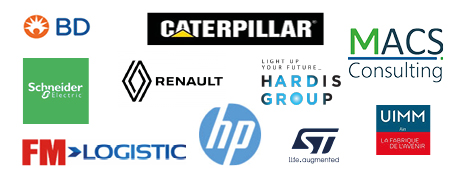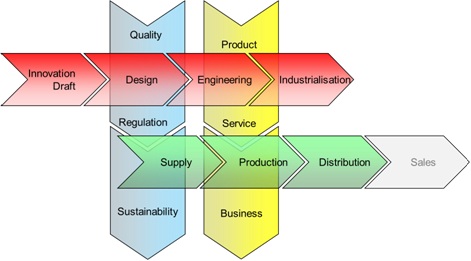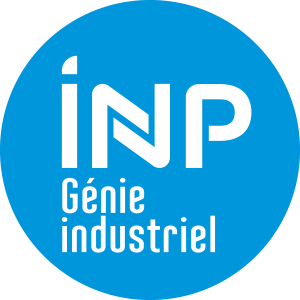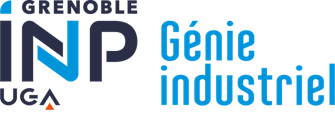
Master Gestion industrielle durable
Overview
Master
- Degree awarded Master
Summary
This Master's program is meant to train professional experts in Gestion industrielle durable, able to deploy skills in a global industrial environment and face the future challenges of the transitions (ecological, digital, societal).
Industry is of critical importance for the modern societies. Industrial engineering, as a branch of engineering, focuses on designing efficient production systems. It is affected by the deep transformations and instabilities the human societies are facing today.
Through this program we aim to provide students with tools to contribute to a more sustainable industry with a strong emphasis on handling of complexity of human centric organizations.
Sustainable Industrial Engineering addresses the issue of industrial sustainability using different points of view. The overarching presence of data requires new skills to handle them. Complexity of socio-technical environment is also a big challenge that requires to understand the multi-dimensional character of the industrial organizations in order to solve the problems raised by the industrial transformation.
Sustainable Industrial Engineering has myriads of application fields since it encompasses the whole value chain and lifecycle of products: from the development of new and innovative products and services, to the end of life of the systems.
The "Gestion industrielle durable" Master also welcomes students from all over the world and includes some excellence programs that propose scholarships for high potential students willing to engage in a research-oriented path leading to a PhD.
The application has to be done on the corresponding websites:
Graduate School - FuturProd
EIT Manufacturing Master School Program
Unite!
SUMA EUropean Master Program (SUMA: SUstainable MAterials)
In second year, you have the choice between 2 majors. One of them is Sustainable Product Development:
The industry today faces major challenges related to the strong environmental impact of human activities. Among these major challenges, the industry must define services with a low carbon footprint while guaranteeing the well-being of people. The sustainable development of industrial products course studies the key areas that will give students the tools to face these challenges and provide a systemic and interdisciplinary understanding of the situation. The main topics are sustainable design, data analysis, innovation, advanced manufacturing, socio-economic aspects of sustainability for Industry 4.0.
The Sustainable Product Development major offers students the opportunity to specialize in research if he then wish to pursue a doctorate. Students also have the possibility of choosing an "industrial" path if they wish to apply directly in industry after a master's degree.
Our teachings are at the cutting edge of knowledge and involve teachers from our affiliated research laboratories, such as G-SCOP for industrial engineering (both supply chain and product development), CERAG for management, PACTE for sociology and GAEL for industrial economics.
Master Thesis
In the second semester of the 2nd year of the Master SIE, each student will be expected to complete an internship either in an industrial firm, in France or abroad. This internship will be an opportunity to consolidate and discover working methods and to learn how to manage real projects. A written dissertation will be required at the end of the training period and it will have to be defended before an examinations board.
Objectives
Becoming:
- Project engineer
- Development or research engineer
- Business or consulting specialized in environmental issues
- Production and supply chain manager
- Consultant in Sustainable industrial engineering
School environment:
Most courses will be provided at Génie Industriel, the Industrial Engineering school of the Grenoble INP group. The school is centrally located in downtown Grenoble. It benefits of a very international environment among the student and of a very modern and high level set of technological platforms.
Student life in Grenoble is very rich and dynamic. Students have the opportunity to engage in external activities such as sports (leading region for mountain sports), arts, non-profit organizations, international relations, or other activities.
Possible research laboratories:
Grenoble
Lyon
Annecy
Companies:

Admission
Entry requirements
Who can apply?
Students wishing to apply to the SIE Master program must hold a MSc in Industrial Engineering or equivalent and B2 minimum level of French
Recruitment Criteria
- MSc in Industrial Engineering
- Excellent academic results
- English proficiency
- French proficiency
Apply now
Online application by "FSA" - This Master is only open to international students. This Master's degree is only available as a full-time program (no work-study option).
The "FSA" application platform is open from 03/11/2025 to 13/04/2026
Visa
All foreign students must obtain a visa.If you are a foreign student from one of these countries: you must apply through both "FSA" and "Etudes en France" :
If you need any advice or support, the Campus France Centre of your country can help you until your visa application (Guide to the platform for international students)
Steps to apply
Applications will be reviewed by committees on the following dates:
- Tuesday 10/02/2026 (application deadline 02/02/2026)
- Tuesday 10/03/2026 (application deadline 02/03/2026)
- Tuesday 21/04/2026 (application deadline 12/04/2026)
If your application is accepted, you will be contacted for an interview in English (usually by videoconference).
Tuition Fees
No exemption based on social criteria possible- For European students (European Union, European Economic Area, Andorra or Switzerland) and for students from Quebec: €254 /year* + €105* "Student and campus life contribution"
- For non EU-students : €3,941 /year* + €105* "Student and campus life contribution"
Tuition fees will be paid upon registration either in one monthly installment or in a maximum of three monthly installments (first payment upon registration, second and third payments in the following two months).
Scholarship
Very few scholarships are awarded each year and they are awarded on merit. We will study your results and, if your level allows it, we will direct your file towards the most suitable scholarship.
Language
Level required: B2 in French and English
► Getting organized
For information on housing, daily life, visa...
Contacts
Education contact
Annabel Jourdan, Maryline Mazzon Teppoz
genie-industriel.scolarite-master@grenoble-inp.fr
Program
- Internships mandatory
Program
Year 1 (60 ECTS)
- Introductory courses in industrial engineering, economics, data management and sustainability;
- Team projects, intercultural communication.
Year 2 (60 ECTS)
- Advanced courses (core curriculum and elective courses) according to the chosen specialization (SIM or SPD, Industry or Research);
- 6-month internship (company, research laboratory).
In Year 2, you have 1 mandatory course depending on your orientation:
- Industry oriented: Master thesis tutorial and communication.
In addition:
- You should select 2 to 3 courses in your major;
- You should select 1 to 2 courses in the transverse offer.
In total you should select 4 courses of 6 credits.
Detailed Program Year 2:
Major Sustainable Product Development:
Programme courses semester 9
Programme courses semester 10
Prospects
Expected learning outcomes
MSc "Gestion industrielle durable" helps tomorrow’s industrial engineers to work collaboratively in a globalized international context, with societal constraints as well as environmental and economical impacts.
The "Gestion industrielle durable" Master programme leans on the knowledge triangle Education-Research-Innovation.
It is designed to cover the whole value chain and lifecycle of product and service, from Innovation draft, through to Distribution, in an international context. (See figure 1)It aims at tackling the key issues that are sustainable manufacturing industry, innovation, and sustainability.

Additional skills and competences are also addressed e.g. in marketing and management as it is key knowledge for the today and tomorrow industrial engineers.
Careers
The Master targets 2 main profiles:
- Industrial engineers with sustainable impact: the students will be able to find jobs in Industrial/ Mechanical/ Production/ Automation/ Aerospace/ Energy/ or Management Engineering
- Researchers in industry: the students will have plenty of opportunities to carry on their studies as PhD among one of the numerous international laboratories of the SIE partners (full members or associates) and the research community in the sustainable manufacturing domain.
Contacts of Masters' degree
- Head of Masters' degree
Jean-François Boujut
Maria Di Mascolo - Admission of Masters' degree
Fabien Mangione
Helmi Ben-Rejeb - Secretary's office of Master's degree:
Annabel Jourdan
Maryline Mazzon-Teppoz
genie-industriel.scolarite-master@grenoble-inp.fr
Tel: (+ 33) 4 76 57 47 18 - International relations department:
Nadia Dehemchi
Academic staff
Head of Sustainable Industrial Engineering Master's degree
Jean-François Boujut
Deputy Head of Sustainable Industrial Engineering Master's degree
Maria Di Mascolo
Admission Board
Fabien Mangione
Administration
Annabel Jourdan, Maryline Mazzon Teppoz
genie-industriel.scolarite-master@grenoble-inp.fr


